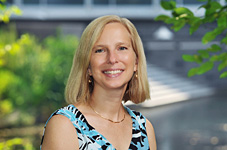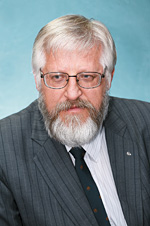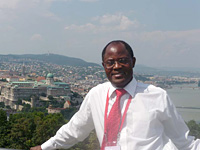Evidence from years of educational research calls for a paradigm shift from traditional, teacher-centric methods to learner-centered practices. Knowledge acquisition and cognitive development are increased when pedagogy and delivery are designed to promote student engagement. This keynote talk will highlight several types of educational innovations that promote student engagement in engineering, provide examples of educational innovations from the author’s institution and from universities around the world, and discuss their educational benefits over traditional methods. The adoption of educational innovations lags behind the awareness of the innovations and the evidence that supports their adoption, and this talk will address some of the barriers to closing that gap. Finally, recommendations for overcoming those barriers will be presented, drawing on the author’s experience.
 Dr. Stephanie Farrell is Professor of Chemical Engineering at Rowan University (USA) and Fulbright Scholar in Engineering Education with the CREATE group at Dublin Institute of Technology (Ireland). As a pioneer of inductive teaching methodology in engineering courses, she has made significant contributions toward project-based learning and novel laboratory experiences to engage students in the scientific discovery process. Dr. Farrell has been recognized nationally and internationally for contributions to engineering education through her work in experiential learning and faculty development. In 2012 she was awarded Honoris Causa in Engineering Education from the Internationale Gesellschaft für Inginieurpädagogik (IGIP). She has been honored by the American Society of Engineering Education (ASEE) with several teaching awards such as the National Outstanding Teaching Medal and the Quinn Award for experiential learning. To help other faculty implement pedagogical strategies that promote student engagement, Stephanie has led workshops around the world and leads a Virtual Community of Practice for research-based instructional approaches. Dr. Farrell has been elected twice to the Board of Directors of the American Society of Engineering Education (ASEE), and she serves on the Executive Committee of the International Federation of Engineering Education Societies (IFEES).
Dr. Stephanie Farrell is Professor of Chemical Engineering at Rowan University (USA) and Fulbright Scholar in Engineering Education with the CREATE group at Dublin Institute of Technology (Ireland). As a pioneer of inductive teaching methodology in engineering courses, she has made significant contributions toward project-based learning and novel laboratory experiences to engage students in the scientific discovery process. Dr. Farrell has been recognized nationally and internationally for contributions to engineering education through her work in experiential learning and faculty development. In 2012 she was awarded Honoris Causa in Engineering Education from the Internationale Gesellschaft für Inginieurpädagogik (IGIP). She has been honored by the American Society of Engineering Education (ASEE) with several teaching awards such as the National Outstanding Teaching Medal and the Quinn Award for experiential learning. To help other faculty implement pedagogical strategies that promote student engagement, Stephanie has led workshops around the world and leads a Virtual Community of Practice for research-based instructional approaches. Dr. Farrell has been elected twice to the Board of Directors of the American Society of Engineering Education (ASEE), and she serves on the Executive Committee of the International Federation of Engineering Education Societies (IFEES).
Rapid changes to the environmental forcing factors such as winds, waves, sea level and ice conditions provide a major challenge for the teaching practice of coastal engineering. This paper gives an overview of a selection of recently identified long-term and rapid variations in the properties of winds and waves in the Baltic Sea basin and the possibilities of the reflection of these changes in the university education. These changes, although evident from a variety observational and modelling efforts, are often ambiguous, different in different locations and controversial. For example, the world’s longest records of visual wave observations in 1946–2012 at the eastern coast of the Baltic Sea reveal a substantial decrease in the wave heights until about 1970 and large decadal variations since then whereas a considerable rotation of the usual wave approach direction was identified at one location. The challenge for the teachers is how to properly apply such data for engineering applications such as the evaluation of wave-driven sediment transport or wave energy resources. This often requires overruling standard concepts relying on simple trends and calls for in-depth explanations of the physics and dynamics behind much more complicated structure of the temporal course of decisive variables.
 Tarmo Soomere graduated in 1980 from Moscow State University as mathematician, received a PhD in oceanology in 1984 and the degree of Doctor of Mathematics in 1992 and was elected as the first Professor of Coastal Engineering in Estonia in 2005.
Tarmo Soomere graduated in 1980 from Moscow State University as mathematician, received a PhD in oceanology in 1984 and the degree of Doctor of Mathematics in 1992 and was elected as the first Professor of Coastal Engineering in Estonia in 2005.
Currently he is the President of the Estonian Academy of Sciences and Head of Wave Engineering Laboratory in the Institute of Cybernetics. His scientific interests include theory and modelling of Rossby waves, internal and surface waves, processes in the nearshore, wave-induced hazards and preventive methods for coastal protection.
He received in 2002 and 2013 the Estonian State Research Award and in 2007 the Baltic Assembly Prize. He was declared the Person of the Year in Estonia 2005 by daily newspaper The Postman for his contribution to the forecast of a devastating storm, elected to Academia Europaea in 2009, nominated as Honorary Professor of the James Cook University in 2010, received the Estonian Science Communication Award in 2011 and the III class Order of the White Star in 2013. He has published >160 research papers and dozens of popular papers.
Africa is home to diverse sources of natural energy (solar, wind, waves, geothermal, oil and gas, and other forms of natural mineral resources). Despite having access to this wealth of energy sources, it remains an established fact that the continent is still referred to as the Dark Continent with little or virtually not enough power for electricity, water, communication and other infrastructures necessary for economic development and sustained growth. There has been call for inclusion of entrepreneurship in engineering curriculum and a review of green IT practices across different nations in the continent. This paper focuses on Nigeria and examines approaches to energy use, green IT practices and role of entrepreneurship in promoting innovation and creativity in higher engineering education and research. It has been reported that a reasonable amount of capital can be saved when businesses adopt efficient measures. In order to achieve this, development of a sustainable Green IT plans are required; such as energy conservation, green procurement, recycling, virtualization, governmental regulations, optimization of the IT infrastructures as well as proper awareness strategies are necessary. This paper identifies and investigates the various challenges and dangers posed by poor or inefficient IT practices, the role of entrepreneurship in engineering education and practice. We explore sustainable strategic IT approaches to overcoming Greening Issues which could have potential impact on economy. A survey of data from a range of studies show that capitals and assets saved through the various measures could facilitate the implementation of solutions to address some of the existing problems related to green IT practices for improved efficiency and sustainability. Current engineering education curriculum has a lot to benefit from the inclusion of entrepreneurship in its content aimed at promoting innovation and enhancing creativity. This would prepare the graduate engineer to be employable globally whilst contributing to the nation’s economic and sustainable development.
 James Uhomoibhi, a native born of Nigeria is an academic of strong international standing in Physics, Computing and Engineering. He has a first degree in Physics from Nigeria, a BPhil degree from Italy and moved to the UK where he completed his MSc in Optoelectronics and Optical Information Processing and a PhD in Laser Physics. Following his initial appointment as lecturer in Queen’s University Belfast he completed a PGCHET in Higher Education. Today he is at University of Ulster where he was Faculty e-learning coordinator (2004-2015) and now lectures in Engineering whilst researching in computer science and education. He is a visiting Professor of Physics, Computer Science and IT in two Nigerian Universities. He is also a visiting Professor of Science, Technology and Environmental Studies at the Open University in Tanzania. James is a Chartered Physicist and a member of the Institute of Physics; He is a Chartered IT Professional and a Fellow of BCS and also a Fellow of the UK Higher Education Academy.
James Uhomoibhi, a native born of Nigeria is an academic of strong international standing in Physics, Computing and Engineering. He has a first degree in Physics from Nigeria, a BPhil degree from Italy and moved to the UK where he completed his MSc in Optoelectronics and Optical Information Processing and a PhD in Laser Physics. Following his initial appointment as lecturer in Queen’s University Belfast he completed a PGCHET in Higher Education. Today he is at University of Ulster where he was Faculty e-learning coordinator (2004-2015) and now lectures in Engineering whilst researching in computer science and education. He is a visiting Professor of Physics, Computer Science and IT in two Nigerian Universities. He is also a visiting Professor of Science, Technology and Environmental Studies at the Open University in Tanzania. James is a Chartered Physicist and a member of the Institute of Physics; He is a Chartered IT Professional and a Fellow of BCS and also a Fellow of the UK Higher Education Academy.
James Uhomoibhi is the African Laser Centre Representative in Europe and has served as Head of SEFI Task Force on European Cooperation with Africa. SEFI is the European Society for Engineering Education. He also sits on the Board of the International Network for Engineering Education and Research (iNEER). He is a member of Council of SEFI and of the BCS, the Chartered Institute for IT. James Uhomoibhi is a member of the Diversity and Inclusion Committee (DIC) and the International of the Institute of Physics (IoP). He is the founder and current Chair of the BCS e-Learning Specialist Group. In 2011 James Uhomoibhi was appointed a LEADS Scholar by the Nigerian National Universities Commission (NUC), charged with the responsibility of linking experts and academics in the Diaspora to the country. He is a recipient several academic and community awards including amongst others, the iNEER Global Achievement Award in Engineering Education (2011), Belfast Ambassadors Award (2012), BCS Long Service Award and the Distinguished Service Award of the Powerlist All Ireland African Leadership Excellence Award Programme, which he received in 2012. James Uhomoibhi very recently received the Sentinus Ambassador of the Year 2016 Award for outstanding works and contributions to STEM Education and Research Development and Implementation in Northern Ireland, UK.
| 06 Oct 2014 | Abstract Submission |
| 20 Oct 2014 | Invitations to Submit Complete Paper |
| 24 Nov 2014 | Complete Paper Submission |
| 15 Dec 2014 | Notification of Acceptance |
| 19 Jan 2015 | Final/Camera-ready Due |
| 18 Mar 2015 | Conference Opening |